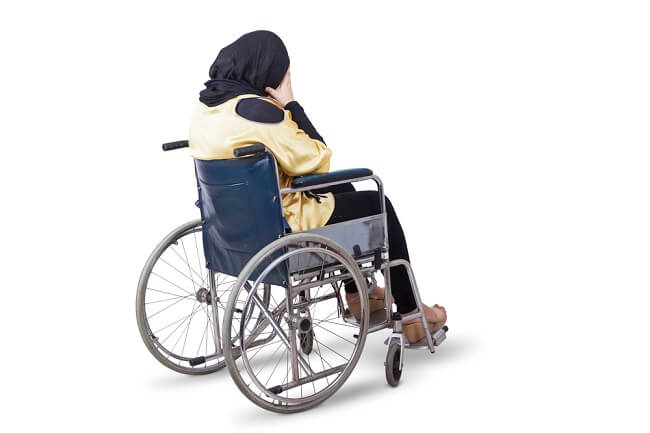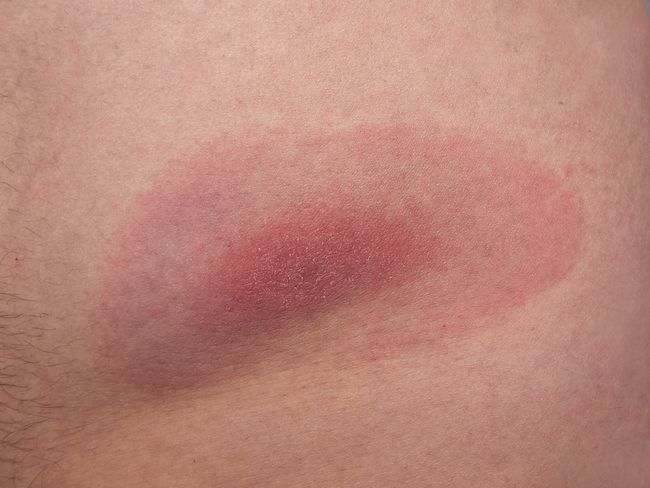Acute thyroiditis or acute thyroiditis is an inflammation of the thyroid gland which is most often caused by a bacterial infection. This condition is more common in children and can be fatal if not treated properly.
The thyroid gland functions to produce thyroid hormones which regulate growth and metabolism. Inflammation and infection of the thyroid gland is actually quite difficult to occur because of the location of the gland which is quite deep and the protective mechanism is quite complete in it.

Acute thyroiditis is usually associated with a weakened immune system and congenital abnormalities, such as a piriform sinus fistula.
Symptom Acute Thyroiditis
Acute thyroiditis will cause symptoms such as:
- Pain in the neck
- Lumps that are red, can move, and feel warm
In addition, the following additional symptoms may also occur:
- Difficult to swallow
- Feeling unwell
- Fever
- Enlarged lymph nodes in the neck
- Changes in posture, which is always bending the neck towards the chest to reduce neck pain
Symptoms of acute thyroiditis can appear suddenly and worsen quickly. Sometimes symptoms of hypothyroidism and hyperthyroidism may also appear.
When to go to the doctor
Immediately consult a doctor if you experience the symptoms of acute thyroiditis that have been mentioned above. Treatment as early as possible is needed to prevent disease progression and complications.
Children with piriform sinus fistula are at increased risk of developing acute thyroiditis. Therefore, if your child has this condition, have regular check-ups with the doctor to prevent acute thyroiditis.
Acute thyroiditis may recur. That is why, people who have suffered from this disease need to see a doctor regularly so that their condition can continue to be monitored.
ReasonAcute Thyroiditis
Acute thyroiditis is most often caused by a bacterial infection (suppurative thyroiditis). Some types of bacteria that often cause this condition are: Staphylococcus aureus, Streptococcus pneumoniae, Streptococcus hemolyticus, and Nocardia spp.
Although rare, acute thyroiditis can also be caused by fungal infections, such as: Pneumocystis jiroveci and Candida sp.
Some conditions that can increase the risk of developing acute thyroiditis are:
- Have a respiratory infection
- 5–12 years old
- Having a birth defect, such as a piriform sinus fistula
- Have low immunity due to HIV/AIDS, chemotherapy, or taking immunosuppressant drugs, such as corticosteroids
- Have or are currently suffering from thyroid cancer
In some cases, acute thyroiditis results from disseminated infection of the heart (endocarditis) and tooth abscess.
DiagnosisAcute Thyroiditis
To diagnose acute thyroiditis, the doctor will ask the patient's complaints and symptoms, as well as the patient's medical history. Next, the doctor will perform a thorough physical examination, including examining the lump on the patient's neck.
To confirm the diagnosis, the doctor will perform a number of supporting examinations as follows:
- Scan with ultrasound, CT scan, or MRI, to detect lumps in the neck
- Complete blood test, to detect infection in the blood
- Hormone function tests, to determine thyroid hormone levels, such as: triiodothyronine (T3), thyroxine (T4), and thyroid stimulating hormone (TSH)
- Fine needle biopsy (FNAB), to assess the cells of the thyroid gland and detect the type of microorganism that causes acute thyroiditis
TreatmentAcute Thyroiditis
Treatment of acute thyroiditis aims to relieve symptoms, treat infection, and prevent complications. Handling will be done by giving medication, drainage (pus draining), and surgery. Here's the explanation:
Pain and fever reliever
Acute thyroiditis will cause fever and pain. To relieve this complaint, the doctor will usually give antipyretic and analgesic drugs. Examples of drugs that can be given are paracetamol and ibuprofen.
Antibiotic drug
If it is caused by a bacterial infection, the doctor will prescribe antibiotics, such as penicillin and clindamycin. The administration can be in the form of oral medication or intravenous injection (through a vein).
If the patient cannot take medication or the infection develops rapidly, the doctor will give antibiotics in the form of intravenous injections. Generally, patients will require hospitalization for a certain period of time.
Pus drainage
In severe cases of acute thyoiditis, usually an abscess (collection of pus) will form. In this condition, the doctor will perform a drainage procedure, which is followed by antibiotics.
Thyroid gland surgery
Surgery will usually be performed if other methods of treatment do not provide optimal results or to repair a piriform sinus fistula that can trigger acute thyroiditis.
Most acute thyroiditis will resolve after undergoing the treatment mentioned above. Even so, the possibility of recurrence is still there, especially if acute thyroiditis is caused by an inherited disorder that has not received treatment.
ComplicationsAcute Thyroiditis
Untreated acute thyroiditis can lead to a number of complications, including:
- A large abscess (collection of pus) in the thyroid gland
- Bleeding in the thyroid gland
- Difficulty breathing
- Sepsis
- Thyroid gland damage
PreventionAcute Thyroiditis
Most cases of thyroiditis, including acute thyroiditis, cannot be prevented. However, you can lower your risk of developing this condition by avoiding its causes and risk factors. This can be done by:
- Carry out regular check-ups with the doctor if you have a disease that can lower your immune system, such as HIV/AIDS.
- Check with your doctor regularly for thyroid disease.
- Prevent infection by maintaining personal and environmental hygiene.









